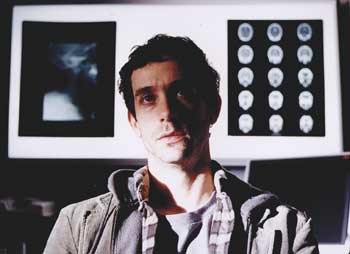![[Metroactive Movies]](/movies/gifs/movies468.gif)
[ Movies Index | Show Times | Silicon Valley | Metroactive Home | Archives ]

Photograph by Sean Garrity/Hypnogogic Images Inc. On The Move: Jonas Chernick tries to treat his patients and fend off his HMO in 'Lucid.' Don't Go Back to Gimli Cinequest looks north for 'Lucid,' a mind-bending thriller that bears the influence of Canada's best filmmakers By Steve Palopoli EVEN A COUPLE of films worthy of export are enough to get most countries some "international cinema" buzz, but any discussion of Canada's contributions are usually limited to which Hollywood productions have run away to Vancouver. But perhaps that's about to change. Toronto's own David Cronenberg has suddenly shot from cult status to the biggest awards circuits on the planet, with A History of Violence nominated for Oscars and Golden Globes (who'd have imagined that when they were watching Marilyn Chambers' armpit grow a vagina dentata in Rabid?). Winnipeg's Guy Maddin, who once seemed doomed to the ghetto of "experimental film" despite making some of the most fascinating movies of the last 15 years, finally had his art-house breakout with 2003's The Saddest Music in the World. Director and co-writer Sean Garrity shows the influence of both of these filmmakers in his second feature, Lucid, a mind trap of a thriller that goes a long way toward suggesting how the legacy of Canadian filmmaking might be defined. The look and feel suggest Cronenberg—cold light, a dynamic palette that uses color to underscore the themes of the film and questions of identity that recall Existenz. There are references to Maddin's work, too (co-writer and star Jonas Chernick has worked with him in the past). The main character in this film wants to stay the hell away from the hospital in Gimli, and if you saw Maddin's Tales From the Gimli Hospital, you know why. Some of the most surreal and eye-catching images also recall Maddin's visual flair. Another point of comparison for Lucid would be Brad Anderson's The Machinist. That was the first conspiracy film I remember seeing that dared to ask if paranoia can sometimes be a cover for personal failures and insecurities. Lucid also toys with that question, and like The Machinist, it sometimes plays like a great episode of The Twilight Zone. But there's something deeper here, as well—there are scenes in Lucid that transcend the confines of a "cool twist story" and capture a truly haunting, even spiritual surrealism that recalls the master of the form, Luis Buñuel. To suggest, however, that Garrity is just an amalgamation of these influences wouldn't be fair: he's got his own obsessions to explore as a filmmaker. He does it with the story of Joel Rothman (Chernick), a therapist who hasn't even handed in his thesis yet but has been hired by a company to handle a particularly weird group of patients: Sophie (Lindy Booth), a tragic-romantic addict; Chandra (Michelle Nolden), who has "self-diagnosed" that she has Traumatic Stress Disorder after seeing her sister injured; and Victor (Callum Keith Rennie), a ball of rage who barely seems able to keep it under the surface. There's a constant power play going on between Joel and his patients: He tries to convince them (as well as himself) that he's worthy of being their doctor, while they try to draw him deeper and deeper into their conspiracy theories of "repeating people" and a "shrinking city"—which is Winnipeg, by the way. Despite his constant rejection of their paranoia, Joel does begin to feel like something Kafkaesque is afoot. His superiors treat him bizarrely and want to take his patients away from him. He also gets caught up in the search for the mysterious "Dave Walker," who Victor claims is behind a trap that has ensnared all of them. The script by Garrity and Chernick is funny and menacing, often at the same time. The atmosphere is tense, and the film does a great job of tossing your support from one explanation or character to another without letting on where it's really going. For instance, you might start to believe Victor's wacky theories, only to have him burst out with something too crazy, like about how all male children are turning gay just to get attention. It's as if the movie is challenging you: Can you believe him now? And that's one of the major themes in Lucid. Beyond just the question of what's real and what's illusion—in this case, delusion—it asks to what extent people can psychically and even physically project their reality onto one another. And when multiple perspectives on reality collide, whose wins? The cast here is talented, too. Chernick is like Ben Stiller without the comic exaggeration. Booth, who was amazing as Dodger in last year's poorly marketed and thus overlooked Cry Wolf, is just as good in a totally different kind of role. Nolden and Rennie balance moments of craziness and vulnerability with deft skill. This is an unusual film—it's such a relief to see a twisty thriller that has the balls to be about something other than a failed heist or some other crime-type triple-cross—that should get everyone involved some notice. With luck, it won't take these Canadians as long as it did Cronenberg and Maddin to get their due.
Lucid (Unrated; 89 min.), directed by Sean Garrity, written by Garrity and Jonas Chernick, photographed by Michael Marshall and starring Chernick and Michelle Nolden, plays March 2 at 9:30pm at the California Theatre, and March 3 at 9:15pm and March 8 at 2:45pm at Camera 12.
Send a letter to the editor about this story to letters@metronews.com. [ Silicon Valley | Metroactive Home | Archives ]
|
From the March 1-7, 2006 issue of Metro, Silicon Valley's Weekly Newspaper.
Copyright © 2006 Metro Publishing Inc. Metroactive is affiliated with the Boulevards Network.
For more information about the San Jose/Silicon Valley area, visit sanjose.com.